2019 Triumph Street Twin review, test ride
Is the new entry-level Bonneville now too swish for our streets? We take it to...well, the streets to find out.
Published on Apr 22, 2019 07:00:00 AM
43,048 Views
Follow us on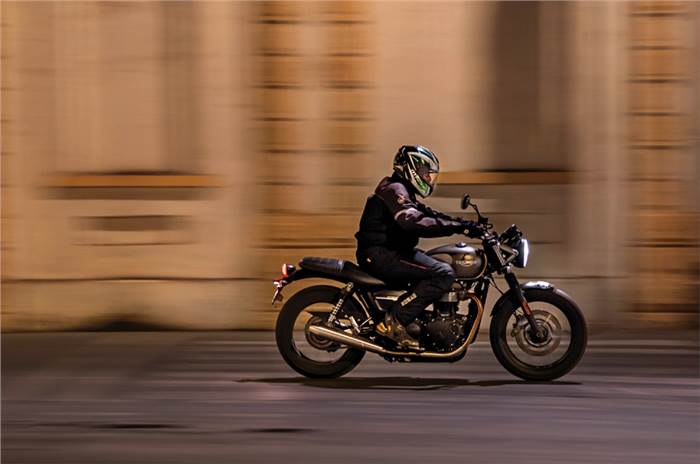
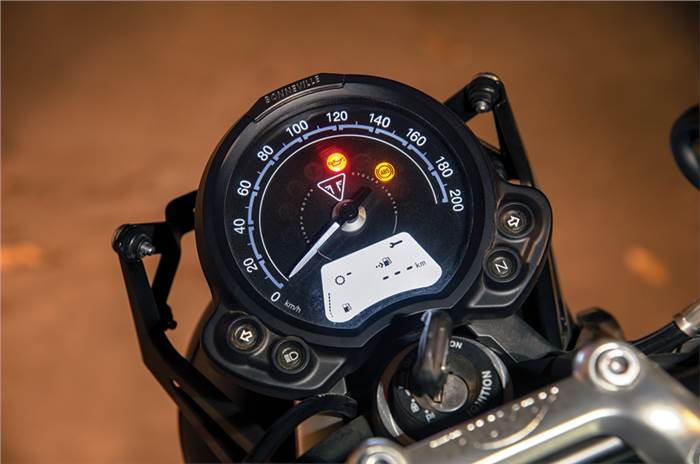
Black surround of meter is tasteful.
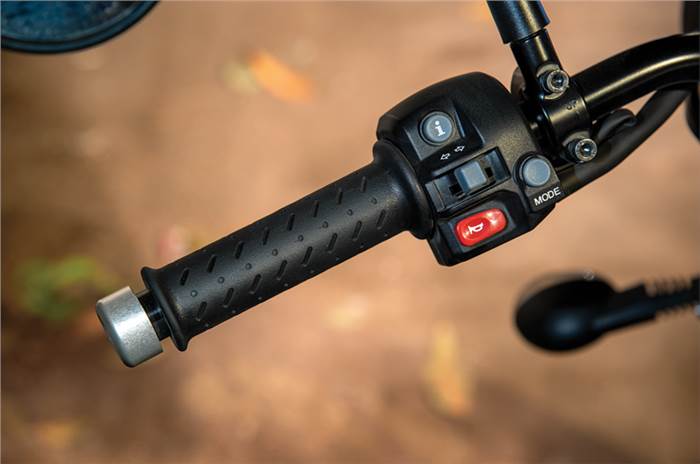
Switchgear is simple and intuitive.
For a moment, I was relieved to be just a bystander. This motorcycle may look affable on the face of it but, as I discovered only moments earlier, it can get its rear wheel to chirrup with very little provocation, unsettling the tail-end briefly before it goes on to punch a small tunnel through the air, leaving a loud burble in its wake. The plan was to be discreet as we tiptoed through the city’s underbelly in the wee hours, but the Street Twin seemed hell bent on blowing our cover. That this is unfolding in a city known never to fall asleep is a small concession; I can, at least, be certain of not stirring up a raging, sleep-deprived mob. But, just for an elaborate moment, I prefer to have it parked. What I have here may be the street-iest, most urbane machine in the Triumph range, but like the millions who overcome the cyclic grind in this city of dreams, the Street Twin can hustle when the time comes.
The setting couldn’t have been more contrasting from when we first met in Spain last year. Far from the blemish-free ribbon of tarmac, Mumbai’s roads are as predictable as a roll of dice, but the Street Twin seems casual about the incredulity of the road surface variations. Just switching lanes involves going through a small canyon of sorts, but the ‘thwack!’ I predict never arrives; it’s a mature motorcycle that feels like a product of rigorous evolution. It hasn’t been very long since the first Street Twin fired up the dream of an accessible big British bike, but the new one seems two generations apart – even though it isn’t, in reality. In the silence of midnight, there’s absolutely nothing uncouth about how the Street Twin rumbles forth. It’s a nice place to be, especially with that deep, mechanical exhaust note from its aluminium-finish twin pipes.
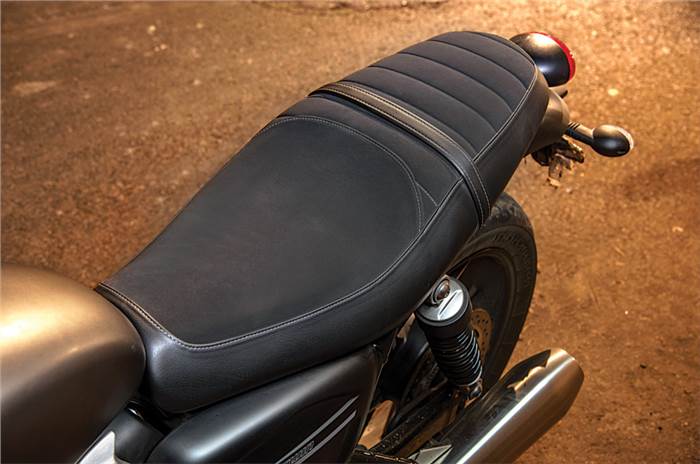
FROM CLOSE QUARTERS
In the shadows, you’ll be hard pressed to tell this is the newest version of the Street Twin. The silhouette is identical – it needn’t have changed anyway – but a lot has evolved in its details. The Matte Ironstone paintjob doesn’t quite do justice to the Twin’s clean, classical lines (or maybe I can just announce that I really don’t like matte-anything), but, sure, it’s well-finished and has an air of swish-ness to it. The tastefully blacked-out engine with its metallic fins is understated at best and the chunky brushed-aluminium headlight brace, along with the machined-design wheels, adds to the impression that this is an expensive motorcycle. The instrument cluster with its white backlight looks similar, save for the new black surround and a ‘Bonneville’ plaque, and the most refreshing change perhaps has been reserved for the side panels, which sure look redesigned but not necessarily prettier.
What I can be sure of is that there never has been such a thing as an unpleasant Bonneville and the new Street Twin doesn’t try to change that. To be reacquainted with one, therefore, was an upbeat affair; I remembered how compact this motorcycle was, as I settled into its seat, set 760mm off the ground. That partly ribbed, half-leather and half-suede-ish seat looks a bit too grandiosely appointed for life on the streets and, at the expense of sounding sadistic, I am very interested in finding out what happens when a pigeon executes an air-strike on it after a heavy lunch. Thankfully, the rest of the Street Twin, despite being consciously ornamental, is still appointed keeping in mind its predominantly urban operating range. Any more garnish than this and it’d probably get mugged down a dark alley.
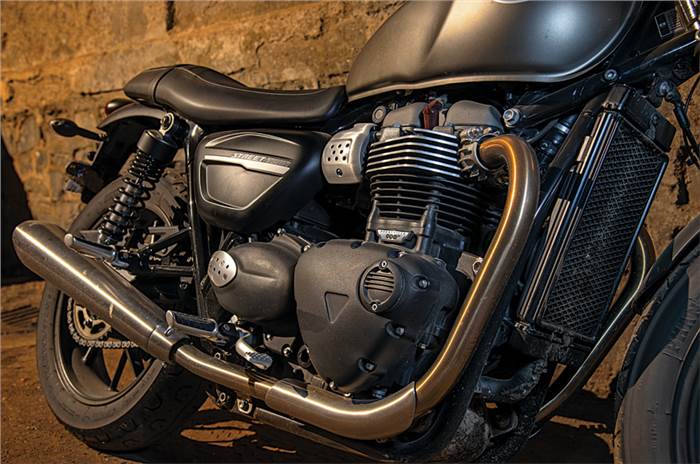
ALL GROWN UP
Or maybe it wouldn’t, given that it’s spent some time pumping iron in the recent past. The 900cc, liquid-cooled, SOHC-equipped twin cylinder motor now produces 65hp (10hp more than before), and to call 80Nm of torque ‘ample’ would be an understatement. Of course, that these output figures are now produced at higher revs than on the older bike is a concern – peak power comes in 1,600rpm later and torque takes an extra 570 revs. However, contrary to my apprehensions, the Street Twin feels loaded and ready to lay down its muscle, perhaps a bit too insistently, if I may add. To those who have experienced the older Street Twin, the new one won’t come across as the childhood sweetheart anymore; it’s now packing heat and unlike the last-gen bike, this one can get a bit unruly if you ask such a thing of it. If I must elaborate, you first turn traction control off and, with Road mode selected (the other one being the milder Rain setting), you wring the throttle twist grip. And then you hold on. This is a quick motorcycle, and while it might be a stretch to call it violent, it sure isn’t as docile as the older-gen Bonnies. In other words, it’s less of a learner-class machine than it used to be.
However, the added grunt is definitely welcome if chasing sunsets down the open highway features prominently on your weekend bucket list. It now cruises with far less effort and the flatter torque curve aids tractability tremendously, although the lack of a 6th gear is definitely something I missed, perhaps more due to instinct than any form of disability. But all things considered, the Street Twin paints a pretty picture of a rugged motorcycle strapped with luggage, ready to take you a thousand kilometres down the road. As a motorcycle that is designed, and destined, to stick by your side through the most formative years of your big-bike journey, the Street Twin is adept at making memories out of even the most arbitrary rides.
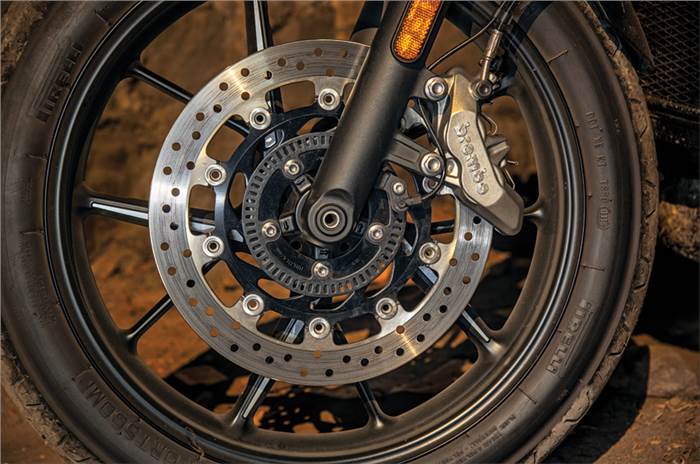
PRACTICALLY PERFECT
To its credit, it now brakes significantly sharper as well. The Brembo four-piston caliper leaves nothing to your imagination as it slashes the Street Twin’s momentum down to a halt, with the comforting blanket of a dual-channel ABS assuring you to expect nothing untoward. This comes in particularly handy in Mumbai, where riding at a fair clip is a luxury that's allowed only in brief spurts. Adding to the sanity is the suspension setup, and while the new 41mm telescopic fork is visibly firmer, the handling benefits are incentive enough to make peace with it. You do notice every expansion joint and pothole, but the pair of plush shock absorbers at the rear do the balancing act well and the result is an overall ride that’s comfortable, if not outrageously supple.
Despite having examined the darkest crevices of this half-awake city until the coolest part of the day – about 4 am, if you ask – I couldn’t help notice the waft of engine heat running continuously over my shin and feet. For a street bike, this level of engine heat is a bit uncharacteristic, and although it steers clear of being repulsive, it’s something you will notice especially if wearing anything skimpier than riding boots. That aside, the Street Twin is well-equipped for an everyday urban dash. And I mustn’t forget to mention the headlight, which offers a good intensity and spread of light in either beam, which is important when the city’s streets are lit erratically.

STREET WIN
The Street Twin’s best characteristic is that, like before, it comes etched with a permanent sense of travel. Regardless of whether you’re snaking through an undiscovered nook in an agreeable part of the country or simply slugging it out in a dense metropolis, the Street Twin feels at home. The progressive soundtrack from its parallel-twin motor makes a lasting impression on your psyche if you live with it long enough, and that it costs a justifiable Rs 7.45 lakh (ex-showroom) to bring one home may keep some of you awake until very late tonight. I’d urge you to give it some serious thought because the Street Twin is now more worthy of your hard-earned money than ever before. And because sometimes, it’s just better to get out there and hustle than be a mere bystander.
Tech Specs 
Copyright (c) Autocar India. All rights reserved.



 Wheels and Tyres
Wheels and Tyres Dimensions & Chassis
Dimensions & Chassis Price
Price Engine
Engine Transmission
Transmission Suspension
Suspension Brakes
Brakes
Comments
Member Login
Personal Details
No comments yet. Be the first to comment.